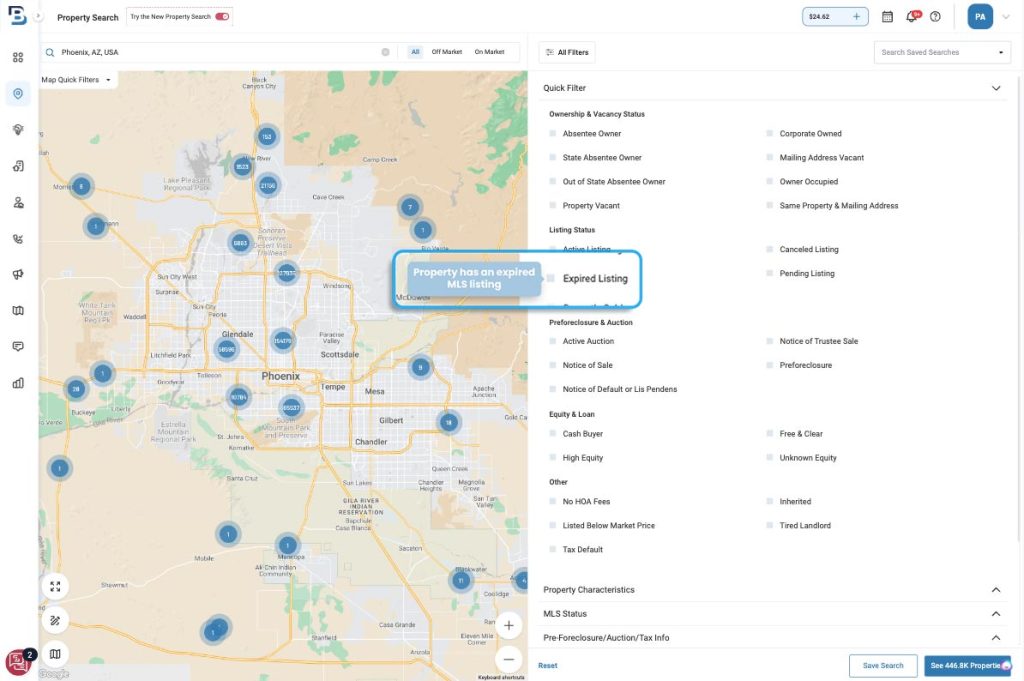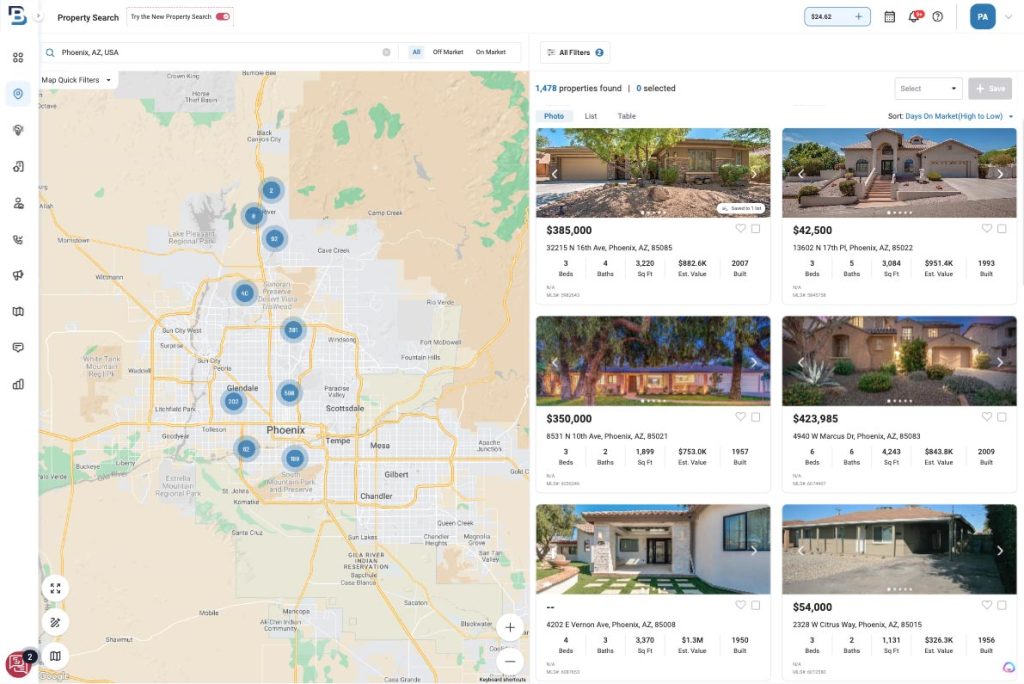In the current housing market, finding inventory can be a challenge. For real estate investors, that means looking beyond MLS listings to find investment opportunities. Off-market properties are appealing to investors for a variety of reasons, but the main advantages are the lack of competition to have their bids accepted and not having to work with a real estate agent.
One type of unlisted property that’s attractive to real estate investors is expired real estate listings. With expired listings, it’s likely that the home is distressed, outdated, or overpriced, leaving the homeowner even more motivated to sell. All of these circumstances can be favorable for investors.
Expired listings versus withdrawn and canceled listings
First, it’s necessary to clarify the difference between withdrawn listings, canceled listings and expired listings. Some less seasoned investors will use these terms interchangeably when they actually mean different things.
In a withdrawn listing, the property is still for sale and is being sold by an agent. It has simply been removed from the MLS. This is different from a canceled listing, in which the agent and the homeowner have both agreed to terminate the listing.
An expired listing means that the contract with the listing agent has expired. The key distinction between these three types of listings is that a withdrawn listing is still being represented by a real estate agent or broker, whereas an expired or canceled listing is not represented by an agent or broker.
Why do listings expire?
An expired listing is a property that did not sell during the contractually agreed upon timeframe between the homeowner and the real estate agent. The typical timeframe for most agent and homeowner contracts is between three and six months.
Unrealistic pricing
There are a variety of reasons why a property doesn’t sell, but the most common reason is that it was priced too high. Sellers can be emotional during the selling process and may reject a listing price for being too low even though it’s reasonable given current market conditions. If they hired an inexperienced realtor, they may go along with the seller’s inflated price.
It’s up to the real estate agent to show their clients what the comps are for their property to demonstrate why a certain asking price is reasonable. Of course, agents can offer sound advice but they can’t force their clients to listen. When a seller asks too much for a property, the property is much more likely to become an expired listing. The longer a property stays on the market, the less likely it is to fetch that premium price.
Under marketed
Another reason a property listing can expire is if the property wasn’t marketed sufficiently. It was only a couple of years ago that a realtor could place a “for sale” sign on the front lawn and have a bidding war later that day.
Today, a realtor has to put more effort into marketing a property. When a property expires, it could be because the agent only did minimal marketing or the agent may not know what they’re doing. This is especially true for less seasoned agents who only know how to sell during a real estate boom.
Poorly staged
Staging can help buyers see the potential in a property, but it’s an expense that not every homeowner wants to take on. If a home is out of style or in disrepair, the right staging becomes a necessity to help buyers see the property as a diamond in the rough. Without thoughtful staging, potential buyers will focus on the flaws and offer less than what the homeowner expects, assuming they get any offers at all.
How to find expired listings
MLS listings
Using the MLS to check for expired listings probably sounds counterintuitive. After all, if a property is listed on the MLS, it’s not an expired listing by definition. The key to this approach is that you use the MLS to find properties that are about to expire. You can set your search parameters to identify listings that will expire within the month. Make a note of when the property listing will expire and reach out to the homeowner at that time.
Agent outreach
Asking real estate agents is another suggestion that may seem counterintuitive. After all, the realtor probably just wants to move on and forget about the property that didn’t sell. You’ll be able to get their attention if you let them know that you’re a real estate investor and you’re willing to pay the agent a referral fee for any deal that closes. This will help you establish credibility and it could result in an ongoing relationship.
Social media
Social media can be a great tool for real estate investors. If you tell your network that you’re looking for expired listings, you might be surprised by who responds.
If you haven’t already joined online forums or communities for real estate professionals, now is the time to join. In addition to helping you find expired listings, you could find a contractor to help you rehab the property and an agent to sell the expired listing once you’ve rehabbed it.
Public records
Checking public records is completely free. You can look into expired listings at your local public records archive, which is commonly at city hall or a local courthouse. Your research can turn up a lot of information about the owners, such as the purchase history, time on market, and whether the property is being sold as the result of a divorce proceeding.
One caveat: while this is a free method of finding expired listings, it’s also incredibly time consuming. Even seasoned real estate investors can spend hours sifting through records to find the information they want. While this is an option that some real estate professionals utilize, it is not time efficient.
Expired listing leads
Purchasing expired listing leads is probably the fastest way to find expired listings, assuming that you invest in high-quality data. This will spare you the trouble of having to sift through public records or scrutinize MLS listings.
With a tool like ListBuilder, you can easily target expired listings using filters like location, property details, and owner information. The lists are generated in real time, allowing you to pull custom lists on demand while ensuring you only pay per lead. If you’re not regularly pulling lead lists, an on-demand tool like this might be a better fit for your business than a software subscription.
Real estate investment software
For investors who are contacting leads daily, a software subscription is the best option for finding expired listings, or any other type of listing that complements your investing strategy. For example, BatchLeads gives users access to more than 150 million property records across the United States. The software allows you to create, manage and organize property lists. You can build lists targeting off-market properties, pre-foreclosures, vacant properties, high equity properties, or target homeowners based on numerous other physical or financial distress factors.

With BatchLeads, you can build expired listing lead lists with a single click.

BatchLeads allows you to add multiple filters to your search so you can pinpoint the expired listings you’d like to target.
Who can benefit from expired listings?
Expired listings can be a great lead source
Real Estate Agents
Finding listings is one of the biggest challenges for Realtors, which makes expired listings an intriguing lead source for several reasons:
- The homeowner has shown there is intent to sell by listing the home
- An expired listing indicates the homeowner might want to work with a new agent
- Compared to traditional lead generation costs, expired listings cost virtually nothing
In addition, a lot of the groundwork has likely already been done by the previous agent, giving a savvy agent the opportunity to adjust the listing price and finetune the marketing strategy for a quick sale.
Investors
An expired listing gives investors insights that properties not on the MLS lack, including the original listing price, price history, and the number of days it was on the market. By combining that information with accurate comparables (aka comps), an investor has the information they need to make a strong offer and lock up a profitable investment.
Wholesalers
Unlike off-market leads, owners of expired listings have already expressed their intent to sell, presenting an excellent opportunity for wholesalers who have active cash buyers. By being able to save the homeowner agent commission fees and offer a quicker sale, wholesalers are in a strong position to turn expired listings into profitable contracts.
Conclusion
Not every expired listing will convert to a deal, but there’s always an inherent advantage to looking at off-market properties. If a property has a history of multiple price reductions and then the listing expires, that could be the reality check that the seller needs to consider offers that are closer to market value.
One tool that can help persuade the homeowner is an ARV calculator. Being able to show a possibly distressed homeowner that you aren’t trying to low ball them and your offer is based on real calculations will help move both parties toward an agreement.



